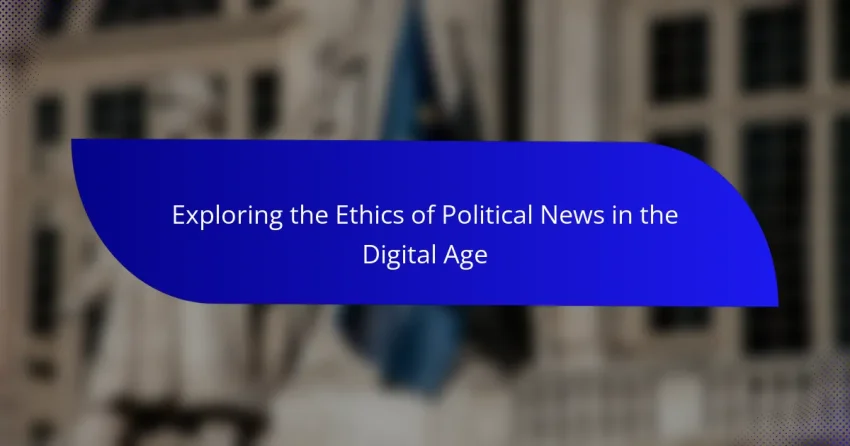In the digital age, the ethics of political news face significant challenges, including the proliferation of disinformation and the erosion of public trust. The rapid dissemination of information through digital platforms not only affects democratic processes but also complicates the responsibilities of journalists to maintain accuracy and transparency. As social media shapes public discourse, understanding these ethical dilemmas is crucial for fostering an informed citizenry.
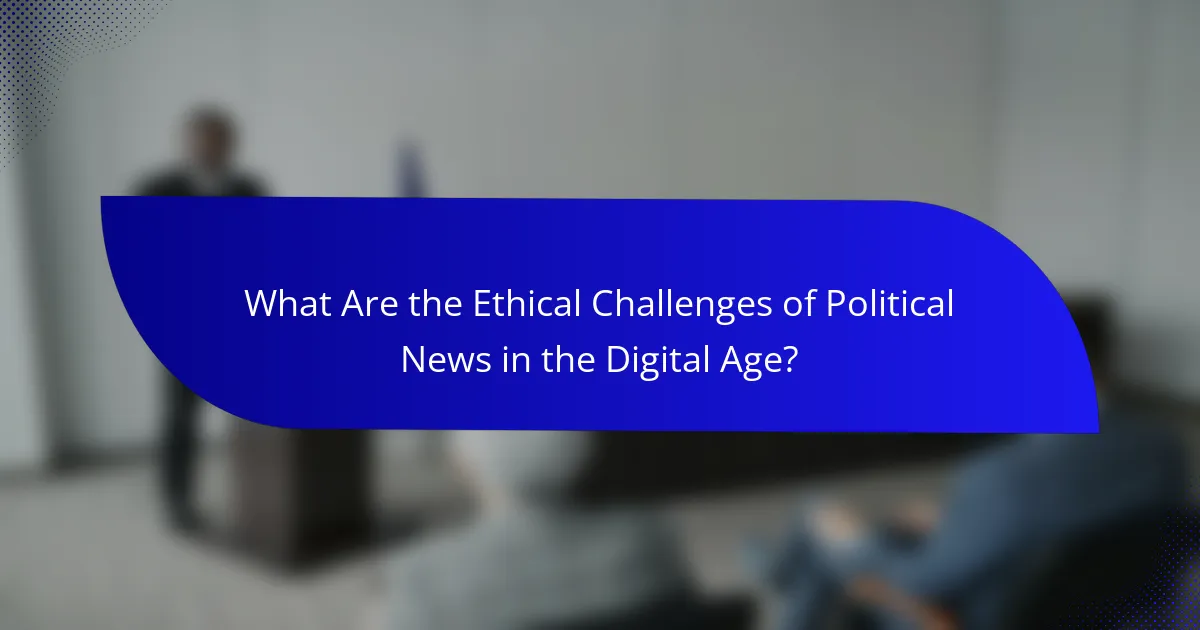
What Are the Ethical Challenges of Political News in the Digital Age?
The ethical challenges of political news in the digital age primarily revolve around the spread of disinformation, bias, privacy issues, and the erosion of public trust. As digital platforms facilitate rapid information dissemination, these challenges can significantly impact democratic processes and informed citizenry.
Disinformation and Fake News
Disinformation and fake news pose significant ethical challenges by misleading audiences and distorting public perception. These false narratives can be spread rapidly through social media, often designed to provoke emotional responses rather than inform. For instance, misleading headlines may attract clicks but fail to represent the actual content accurately.
To combat disinformation, consumers should verify news sources and cross-check information against reputable outlets. Tools like fact-checking websites can help discern truth from falsehood, promoting a more informed public discourse.
Bias and Partisanship
Bias and partisanship in political news can skew public understanding and reinforce existing beliefs. Many news outlets may present information in a way that favors a particular political stance, leading to a polarized audience. This can create echo chambers where individuals only engage with viewpoints that align with their own.
To navigate bias, readers should seek diverse news sources and be aware of their own biases. Engaging with a variety of perspectives can foster a more balanced understanding of political issues.
Privacy Concerns
Privacy concerns arise as political news often involves the collection and analysis of personal data to target audiences effectively. This can lead to ethical dilemmas regarding consent and the potential misuse of sensitive information. For example, political campaigns may use data analytics to tailor messages, raising questions about the transparency of such practices.
Individuals should be cautious about the information they share online and consider adjusting privacy settings on social media platforms. Understanding data privacy policies can help mitigate risks associated with personal information exploitation.
Impact on Public Trust
The proliferation of unreliable political news can erode public trust in media institutions and democratic processes. When audiences encounter frequent misinformation, they may become skeptical of all news, leading to disengagement from civic duties. This decline in trust can have long-term implications for political participation and accountability.
To rebuild trust, media organizations should prioritize transparency and accountability in their reporting practices. Engaging with the audience through open dialogues can also help restore faith in journalism.
Manipulation of Algorithms
Manipulation of algorithms on social media platforms can exacerbate the spread of biased or misleading political content. Algorithms often prioritize engagement over accuracy, promoting sensationalist stories that capture attention but may lack factual integrity. This can create a distorted view of political realities for users.
To counteract algorithmic manipulation, users should be proactive in curating their feeds and following a range of credible sources. Additionally, advocating for algorithmic transparency can help push platforms towards more responsible content moderation practices.
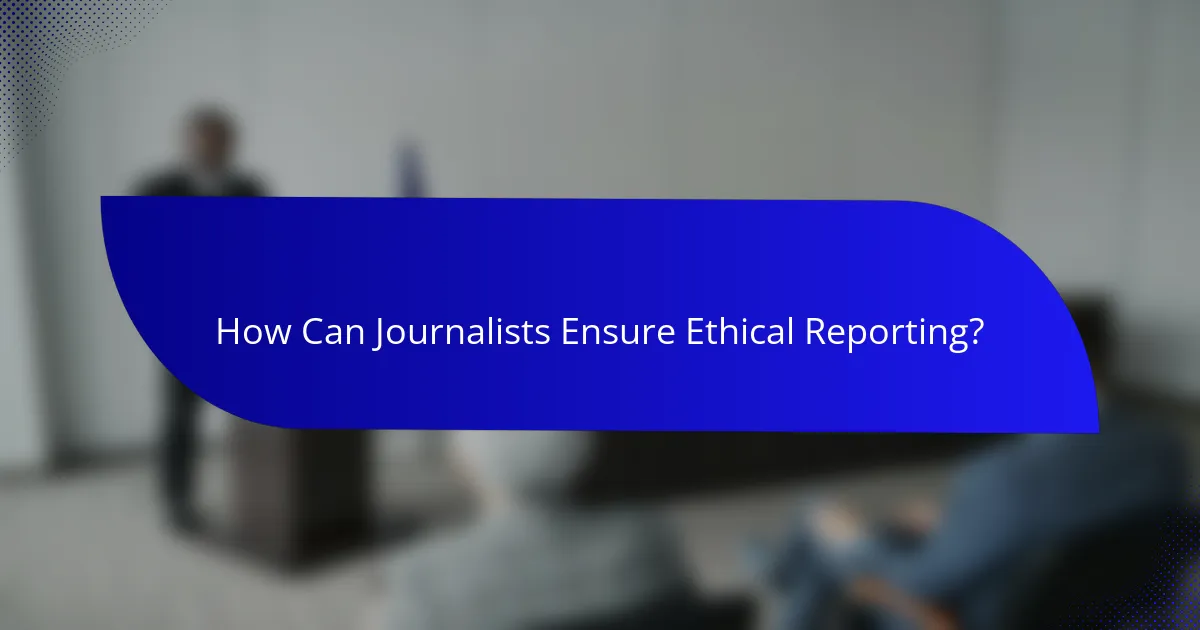
How Can Journalists Ensure Ethical Reporting?
Journalists can ensure ethical reporting by adhering to established standards that prioritize accuracy, transparency, and accountability. This involves implementing rigorous fact-checking, being open about sources, and following ethical guidelines that govern the profession.
Fact-Checking Practices
Fact-checking is a critical component of ethical journalism. Journalists should verify information through multiple credible sources before publication to avoid spreading misinformation. Utilizing established fact-checking organizations can enhance credibility and ensure accuracy.
Common practices include cross-referencing data, consulting experts, and using primary sources. Journalists should aim to fact-check claims within a reasonable timeframe, ideally before the news is disseminated to the public.
Transparency in Sources
Transparency in sources builds trust with the audience. Journalists should clearly attribute information to its original source and disclose any potential conflicts of interest. This practice allows readers to assess the reliability of the information presented.
When possible, journalists should provide direct links to sources or include citations. This not only enhances credibility but also empowers readers to explore the information further, fostering a more informed public.
Adherence to Ethical Guidelines
Adhering to ethical guidelines is essential for maintaining journalistic integrity. Many organizations, such as the Society of Professional Journalists, provide codes of ethics that outline principles like fairness, accuracy, and independence. Journalists should familiarize themselves with these guidelines and apply them consistently.
Common pitfalls include sensationalism and bias, which can undermine trust. Journalists should strive for balanced reporting, presenting multiple viewpoints and avoiding conflicts of interest to uphold ethical standards in their work.

What Role Do Social Media Platforms Play?
Social media platforms significantly influence the dissemination of political news by shaping how information is shared and consumed. They serve as both channels for news distribution and arenas for public discourse, impacting public perception and engagement with political issues.
Content Moderation Policies
Content moderation policies on social media platforms dictate what political news can be shared and how it is presented. These policies often aim to reduce misinformation and hate speech but can also lead to the suppression of legitimate discourse. Users should be aware of these guidelines, as they can vary widely between platforms.
For example, platforms like Facebook and Twitter have implemented fact-checking systems and community guidelines that may restrict certain posts. Understanding these policies can help users navigate the complexities of political news online.
Algorithmic Transparency
Algorithmic transparency refers to how openly social media platforms disclose the workings of their content recommendation systems. These algorithms determine which political news appears in users’ feeds, influencing their exposure to diverse viewpoints. A lack of transparency can lead to echo chambers, where users only see information that aligns with their beliefs.
Users should seek platforms that provide insights into their algorithms and consider diversifying their news sources to mitigate bias. Engaging with multiple platforms can help ensure a more balanced understanding of political issues.
Partnerships with News Organizations
Partnerships between social media platforms and news organizations play a crucial role in shaping the quality of political news available online. These collaborations can enhance the credibility of information shared on social media, as established news outlets often adhere to journalistic standards.
However, users should critically evaluate the sources of political news they encounter on social media. Recognizing which news organizations are partnered with platforms can help users discern the reliability of the information presented.
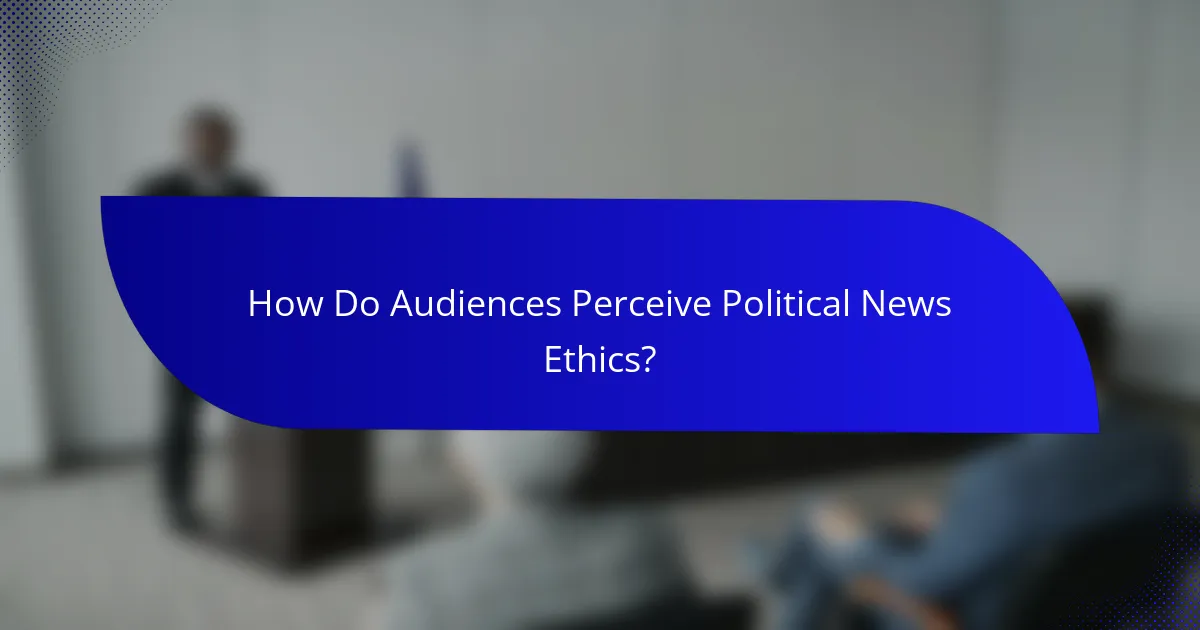
How Do Audiences Perceive Political News Ethics?
Audiences perceive political news ethics through the lens of trust, transparency, and accountability. Factors such as the credibility of sources, the influence of social media, and the engagement with fact-checking play crucial roles in shaping these perceptions.
Trust in News Sources
Trust in news sources is fundamental to how audiences evaluate political news ethics. Many individuals rely on established media outlets, but trust can vary significantly based on personal beliefs and experiences. Surveys indicate that trust levels can range from low to moderate, often influenced by political alignment.
To enhance trust, news organizations should prioritize transparency about their reporting processes and sources. Audiences are more likely to trust outlets that openly disclose their methodologies and corrections.
Influence of Social Media
Social media significantly impacts how audiences perceive political news ethics by shaping the dissemination and consumption of information. Platforms like Twitter and Facebook can amplify both credible news and misinformation, complicating ethical assessments. Users often encounter a mix of professional journalism and user-generated content, which can blur the lines of reliability.
To navigate this landscape, audiences should critically evaluate the sources of information shared on social media. Checking the original source and looking for corroborating reports can help distinguish between credible news and misleading narratives.
Engagement with Fact-Checking
Engagement with fact-checking is essential for audiences seeking to understand political news ethics. Fact-checking organizations play a vital role in verifying claims made in political discourse, helping to hold sources accountable. Many audiences are increasingly turning to these resources, particularly during election cycles.
To effectively engage with fact-checking, audiences should familiarize themselves with reputable fact-checking websites and tools. Regularly consulting these resources can improve media literacy and help individuals make informed judgments about the political news they consume.
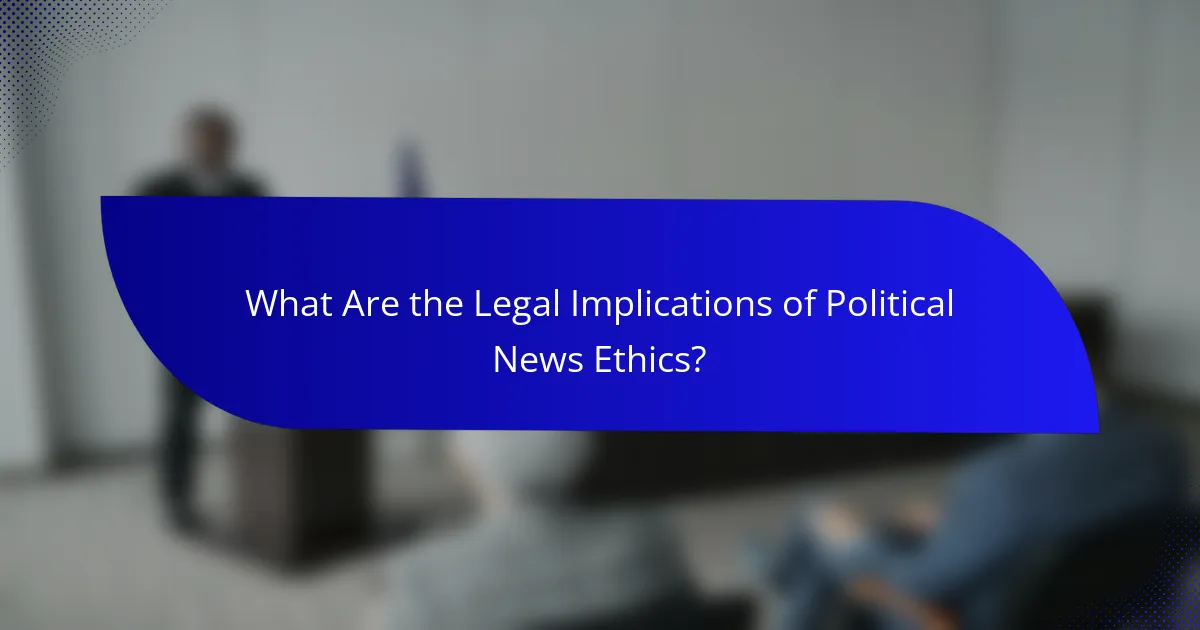
What Are the Legal Implications of Political News Ethics?
The legal implications of political news ethics revolve around regulations that govern the accuracy and integrity of information disseminated to the public. These laws aim to prevent misinformation and protect the rights of individuals and organizations involved in the political process.
Regulations on Misinformation
Regulations on misinformation are designed to combat false information that can influence public opinion and electoral outcomes. In many jurisdictions, including the United States and European Union, laws exist to hold publishers accountable for spreading false claims, especially during election cycles.
For example, the Federal Election Commission (FEC) in the U.S. monitors political advertising to ensure compliance with truth-in-advertising standards. Similarly, the EU has implemented the Digital Services Act, which requires platforms to take action against misinformation and provide transparency in political advertising.
To navigate these regulations, news organizations should establish clear editorial guidelines, fact-checking protocols, and training for journalists on ethical reporting practices. Avoiding sensationalism and prioritizing accuracy can help mitigate legal risks associated with misinformation.
